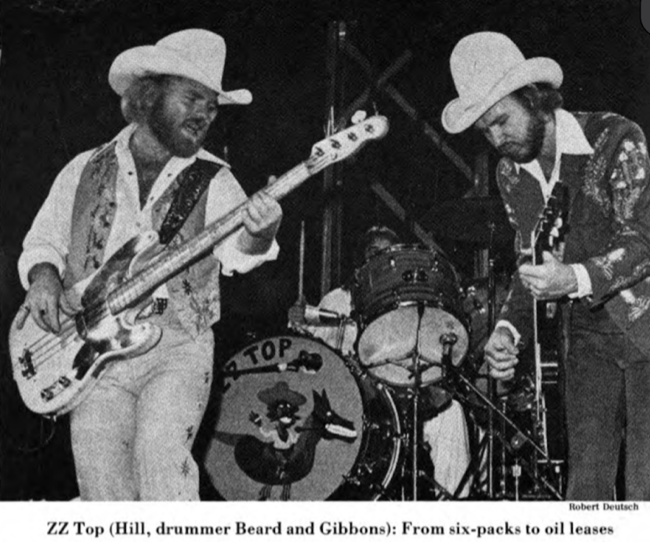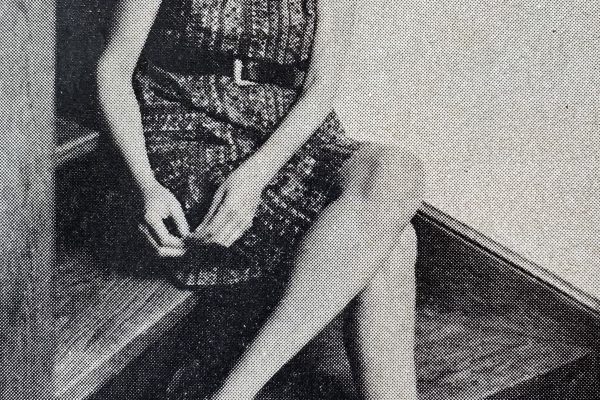Original Publication – Newsweek, December 8, 1975.
ZZ Top bills itself as “that little ol’ band from Texas.” In the last year and a half little ol’ ZZ – a three-man group specializing in the gut-level rock for long-haired red-necks – has smashed more than a dozen box-office records to become one of the biggest concert acts in the country. It has grossed more than $10 million in personal appearances so far this year. It has outdrawn Elvis Presley in Nashville, broken Led Zeppelin’s attendance record for New Orleans, and reportedly sold more records last summer than the Rolling Stones at the height of their celebrated national tour.
Yet ZZ Top has never made the top ten with a hit single because it does not get air play on such make-or-break AM rock stations as New York’s giant WABC. Nor has the group been pushed by the critics, who tend to dismiss it as primitive. Still, ZZ top has tapped a vein of solid gold in grass-roots America. In addition to its concert success, two of its four albums have achieved “platinum” status (sales of 1 million units each). Its last one, “Fandango,” is still selling 50,000 albums a week more than six months after its release.
In the early ‘60s the Beach Boys made “let’s go surfin’ now” a national imperative – even on the prairies. Now ZZ Top is out to make hell-raising along the Mexican border a good time everyone can share. “Most of the things we write about are very Texas,” says bass guitarist Dusty Hill, “but everybody everywhere goes to whores, drinks beer, and drives fast.” Musically, ZZ doesn’t come close to the Beach Boys. But it does play a brand of basic bluesy boogie rock that makes audiences at least want to light firecrackers. During a recent concert at New York City’s Felt Forum the crowd set off several cherry bombs in appreciation.
Thrills: Onstage in spangled cowboy suits (costing a reported $1,300 apiece), Hill and lead guitarist Billy Gibbons, backed by drummer Frank Beard, all 26, sing about such Texas landmarks as a now defunct whorehouse in La Grange. In “Precious and Grace” they tell of picking up two female ex-con hitch hikers, and in “Master of Sparks” they describe what it’s like to be kicked off the back end of a speeding pickup – for thrills. “Rock ‘n’ roll started as a rebellious Southern form of musical expression,” says Gibbons. “We are trying to synthesize our Texas way of being into music.”
Gibbons, a former art student, started out at 18 as a protégé of the late Jimi Hendrix, who showed him guitar licks while Gibbons was playing with a psychedelic rock band in Houston. In 1970, he formed ZZ Top (the name’s derivation is a “secret”) with Beard and Hill, who were from rival bands in Dallas.
ZZ began with appearances in Texas beer halls where drunken brawls and gunfights only enhanced their act. “Our motto,” says Gibbons, “was keep playing and turn up the amp a little,” ZZ developed a strong regional base that solidified north of the Mason-Dixon line with the release of its third album, “Tres Hombres.” Now, instead of pickups, they drive Eldorado convertibles and are stocking up on oil leases instead of six-packs.
For Thanksgiving last week, ZZ Top went home to give shows in San Antonio, Houston, Fort Worth and Dallas – selling out 36,000 tickets in less than twelve hours at Houston’s new arena, The Summit. “Honest ignorance” is how Billy Gibbons describes ZZ’s appeal. Old-fashioned bull Texas style, is more like it.
This article is typed from the original material. Please excuse any errors that have escaped final proofreading.


